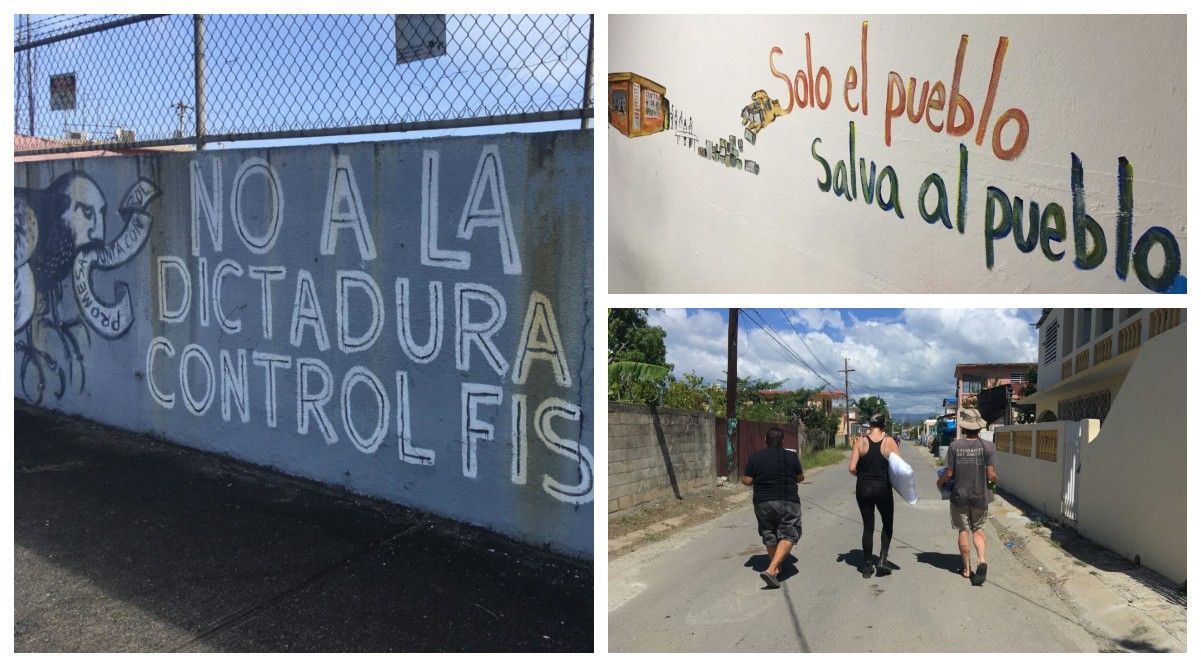Filed under: Action, Caribbean, Community Organizing, Disaster

Report from Mutual Aid Disaster Relief on growing autonomous relief efforts following the recent earthquakes.
On January 7th, 2020, a 6.4 magnitude earthquake hit Puerto Rico, causing widespread damage in the south and temporarily knocking out power throughout the island. There have been thousands of earthquakes and tremors starting in late December 2019 and continuing to the present day in the south of Puerto Rico. What were once homes and local shops are piles of rubble, displacing over 8,000 people. Hundreds of camps have popped up in front of people’s prior homes and in nearby open spaces.
Guanica, one of the epicenters of the earthquakes, was the site of the first Spanish conquistador forces in Boriken. Ponce de León arrived in Guánica Bay in 1508. This original settlement was destroyed in the Taíno Rebellion of 1511. The United States also landed here in 1898, and ushered in a new phase of colonization. Today, an unelected financial control board, PROMESA, imposes austerity throughout the island and siphons Puerto Rico’s funds off to venture capitalists to pay neverending debt. And residents of Guanica warn that the homes that did survive the earthquake might not survive the plans for luxury hotels, long on the wishlist of developers in the region.
No time was wasted waiting for the government or large institutions. People throughout the island immediately organized spontaneous, autonomous caravans to bring seas of supplies and meet the material needs of the people in the south. When word got out that supplies were rotting in government warehouses since Hurricane Maria, people showed up in mass and requisitioned them.
Solidarity brigades have continued, such as the inspiring work of Brigada Solidaria del Oeste. The network of mutual aid centers on the island kicked into higher gear and have been meeting the needs of people in the south impacted by the earthquakes directly with dignity and compassion.
We are fortunate to be a small part of this groundswell, a growing movement using mutual aid as an end and the means for collective liberation. Distributing tents, mattresses, camping stoves, and batteries and building d.i.y. showers feels like simple little things. And they are. But we also feel that this way of relating with each other, of breaking down the walls that divide us, of running to the crisis instead of running away, offering our hands and what they can gather, and sharing with dignity and equality – nobody above, nobody below, is moving us towards where we want to be.
Throughout our times here, it has been clear that people in the rest of the United States could learn a great deal from Puerto Rico, that an understanding of our age’s demand for solidarity and mutual aid has generalized here far beyond where it has in the States. Anyone coming here to do mutual aid work should understand that the Puerto Rican people are experts in the subject – and while others may bring some of their own specific skills or expertise or resources, it is always necessary to put those things in service to Puerto Rican’s own vision of what they are building.
For an in-depth interview on the situation on the ground in Puerto Rico post-earthquakes, check out Martin and Pluma on Act Out! and this interview from It’s Going Down: “The Spark Is Already There & the Flame is Catching On”: Between the Shell of the State & the Growth of Autonomy in Puerto Rico.
"I really think we're on the verge of seeing yet another model; like the Zapatistas, like Rojava." We talked to @ConioMeng about the increasing collapse of the State in #PuertoRico + the growth of autonomous, self-organized, and mutual aid driven politics. https://t.co/Tqe0mDpgyq pic.twitter.com/RZkJQPEQvP
— It's Going Down (@IGD_News) February 1, 2020
Doing mutual aid work is planting the seeds that will take root and bring the fortress down. This is seen clearly in Puerto Rico, where what began as self-organized responses to disasters organically grew and fed into mobilizations and uprisings that brought down the governor, and again are shaking the ground beneath the powerful.
A spell has been cast to have us believe that the state and halls of politics and economics are where power resides. But that spell is breaking. We are everywhere. The possibility and power to act is inside us and all around us. We can rescue empty buildings and make them into mutual aid centers with wellness centers, legal clinics, computer stations, gardens, tool libraries, laundromats, art therapy, or whatever the community needs most. We can build our own infrastructure so we are less reliant on those who oppress us. There is more power there than in their tanks and fighter jets.
Colonization, in addition to the relentless extraction of wealth from the poor, black, and brown for the rich and white, also consists of mental prisons imposed on both oppressors and oppressed. In order to break through these barriers part of the answer may lie in looking outside of ourselves and our communities, in acknowledging the interrelatedness of struggles near and far.
How does one shake off invisible chains?
Like this, friends.
Like this.





